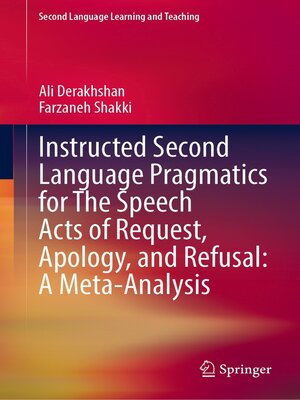Instructed Second Language Pragmatics for the Speech Acts of Request, Apology, and Refusal
ebook ∣ A Meta-Analysis · Second Language Learning and Teaching
By Ali Derakhshan

Sign up to save your library
With an OverDrive account, you can save your favorite libraries for at-a-glance information about availability. Find out more about OverDrive accounts.
Find this title in Libby, the library reading app by OverDrive.



Search for a digital library with this title
Title found at these libraries:
| Library Name | Distance |
|---|---|
| Loading... |
Pragmatic instruction has received momentous attention in Second Language Acquisition (SLA) over the last decades. In order to scrutinize the effectiveness of L2 instruction, meta-analyses are warranted; nonetheless, meta-analyses have been largely neglected, despite the fact that they provide a systematic explanation of the findings from the previous studies. Since meta-analysis is flourishing by leaps and bounds in each and every field, pragmatic studies are not the exception, and among miscellaneous constructs and units of analysis in pragmatics, the speech acts of request, apology, and refusal are investigated in this book. To bridge this gap, this book mainly presents the variables which can moderate the effectiveness of L2 instruction such as age, gender, proficiency, outcome measures, psycholinguistic features, research design, and treatment types. The first chapter of the book outlines the theoretical underpinnings of the study, accentuating the importance of conducting meta-analysis in this field of study. The second chapter elaborates on the empirical studies and a thorough review of the relevant research. The third chapter deals with the design of the study in which the inclusion and exclusion criteria, effect size calculation, coding of the variables, and reliability have been outlined while chapter four presents the obtained outcomes and results of the study. The last chapter describes the final remarks of the study, the limitations, implications, and the directions for future research in the field of pragmatics instruction.







